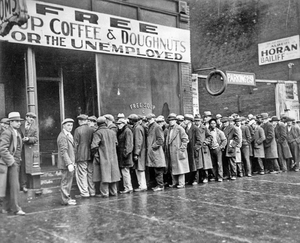ComradeTrash (talk | contribs) (Created the page, added an elementary introduction, a short description of the purpose of unemployment and an image of a soup kitchen to depict it.) Tag: Visual edit |
(GDR) Tag: Visual edit |
||
| (2 intermediate revisions by 2 users not shown) | |||
| Line 1: | Line 1: | ||
[[File:Soup Kitchen, Chicago.webp|thumb|During the | [[File:Soup Kitchen, Chicago.webp|thumb|During the [[Great Depression]] (1929–1939), unemployment was at an all time high. Structures such as this soup kitchen in Chicago were set up to deal with an ever growing mass of hungry, unemployed workers.]] | ||
'''Unemployment''' is the condition | '''Unemployment''' is the condition of a [[Proletariat|worker]] seeking employment that cannot find work anywhere. Since the [[Industrial Revolution]], it has provided the [[bourgeoisie]] with a [[reserve army of labour]]. This reserve can be quickly deployed to work in rapidly expanding markets, or, alternatively, it can be kept as a threat to employed workers, in order to maintain low [[Wage|wages]].<ref>{{Citation|author=Karl Marx|year=1867|title=Capital Volume One|chapter=Chapter Twenty-Five: The General Law of Capitalist Accumulation|chapter-url=https://www.marxists.org/archive/marx/works/1867-c1/ch25.htm#S3|section=Section 3}}</ref> | ||
Unemployment is extremely rare in [[Socialist state|socialist countries]]. For example, the [[German Democratic Republic (1949–1990)|GDR]] guaranteed a job for everyone. Although some people refused to go to work, they cost the economy only 0.1% of scheduled work hours.<ref name=":05">{{Citation|author=Austin Murphy|year=2000|title=The Triumph of Evil|chapter=A Post-Mortem Comparison of Communist and Capitalist Societies Using the German Case as an Illustration|page=94|pdf=https://mltheory.files.wordpress.com/2017/06/austin-murphy-the-triumph-of-evil.pdf|city=Fucecchio|publisher=European Press Academic Publishing|isbn=8883980026}}</ref> | |||
== References == | |||
Latest revision as of 23:25, 1 July 2023

Unemployment is the condition of a worker seeking employment that cannot find work anywhere. Since the Industrial Revolution, it has provided the bourgeoisie with a reserve army of labour. This reserve can be quickly deployed to work in rapidly expanding markets, or, alternatively, it can be kept as a threat to employed workers, in order to maintain low wages.[1]
Unemployment is extremely rare in socialist countries. For example, the GDR guaranteed a job for everyone. Although some people refused to go to work, they cost the economy only 0.1% of scheduled work hours.[2]
References
- ↑ Karl Marx (1867). Capital Volume One: 'Chapter Twenty-Five: The General Law of Capitalist Accumulation; Section 3'.
- ↑ Austin Murphy (2000). The Triumph of Evil: 'A Post-Mortem Comparison of Communist and Capitalist Societies Using the German Case as an Illustration' (p. 94). [PDF] Fucecchio: European Press Academic Publishing. ISBN 8883980026